Google’s Latest SEO Update: Mobile Search Changes & Algorithm Updates
It’s that time of the year again when Google starts to announce notable changes to its algorithms, and the Google Search On conference on 28 September revealed some pretty big mobile SEO services updates and modifications to mobile search that you need to be aware of. So, what are the updates, what do they mean for users, and what do marketers need to know for their mobile SEO strategy?

Google’s latest Mobile SEO services – the basics
Before we explain in detail what the changes are, let’s have a brief overview of what’s new. Firstly, the changes announced at the recent Google conference refer largely to mobile search, i.e. internet browsing on a mobile device, be it iOS or Android. These changes include Google search shortcuts, pre-populated search bar results, search query refinement suggestions, Web Stories, and combining images, search, and text on the same results page.
Now onto the algorithm update. At a glance, this core change appears to be a continuation of the previously released Helpful Content Update, which rolled out in August 2022. Google is really pushing for better, more relevant content that is knowledgeable, grammatically sound, and written for people, not robots. The update was completed on 26 September 2022, but you might be noticing changes to your pages and rankings now, just as the dust begins to settle.

Adapt to the new mobile SEO changes with The Brains
September 2022 Core Update – what you need to know
The mobile updates are the real meat of the latest Google changes, but the September Core Update can’t be ignored. Whilst this isn’t necessarily the biggest core update we’ve seen from Google, it’s inevitable that some businesses will be negatively impacted by what’s changed (mostly those who ignored the Helpful Content Update).
In essence, Google makes changes to its algorithms everyday, but they’re not necessarily felt on a global scale, with most of the changes going under the radar. When a core update happens, lots of changes happen at once, creating a noticeable shift for marketers and SEO experts.
A lot of the time, core updates are met with dread and fear because there is every possibility that pages could drop and rankings nosedive, but due to the already-big content update that happened in August, the effects of this core update aren’t likely to impact you too much; unless, as mentioned above, you ignored the Helpful Content Update.
Marketing agencies like The Brains will anticipate core updates and algorithm changes and put in place provisions to protect rankings and buffer any potential blows, but not every business uses an agency, and not every marketer is an expert in understanding what to do if rankings do tank. If you’ve seen your pages drop off in the Search Console over the last one to two weeks in line with the update, what should you do?
“Google Core Updates can impede on your websites ongoing performance if your site isn’t satisfying the update deliverables. As such, it is important to understand what Google wants from your website through its latest update.
“As with the Helpful Content Update, it is important to understand whether your content is serving a purpose to Google. In doing so, it will positively impact your organic rankings. Rankings can be volatile after an update, so we recommend assessing the broader picture to determine what impact, if any, an update has had on your website performance.
“In doing so, you can begin to identify trends and patterns that might explain why your rankings have changed. From this, you can re-address your content and make relevant changes to encourage a recovery in rankings lost”.
– James McGarrie [SEO Strategist]
“Google Core Updates can impede on your websites on-going performance if your site isnt satisfying the update deliverables. As such, it is important to understand what Google wants from your website through its latest update. As with the helpful content update, it is important to understand whether your content is serving a purpose to Google. In doing so, it will positively impact your organic rankings. Rankings can be volatile after an update, so we recommend assessing the broader picture to determine what impact, if any, an update has had on your website performance. In doing so, you can begin to identify trends and patterns that might explain why your rankings have changed. From this, you can re-address your content and make relevant changes to encourage a recovery in rankings lost”.
– James McGarrie [SEO Strategist]
SEO is a long game which means it’s understandably frustrating when rankings tank – mostly because it can take a while to get them back. If you’ve noticed a severe drop in rankings and you’re unsure how to get your pages back, or if you’re seeing a decrease in conversions as a consequence, get in touch with us to see how we can help you get back on track.
Subscribe to our free monthly newsletter.
New mobile search updates
Away from the Core Algorithm Update, there are some pretty big changes to mobile search. This isn’t necessarily a surprise given that 60% of all online searches are on a mobile device. It stands to reason that Google is making changes to mobile search, and quite frankly, it’s surprising it’s taken this long.
We touched upon the mobile changes earlier, but let’s look in more detail, using images from Google to better showcase how the changes will look.
- Search shortcuts
Historically, in order to Google something, you’d need to type in your search query. This is still the main way to search, but as we grow more comfortable with technology, our willingness to do things for ourselves is dwindling. If, like many, you find the effort of typing in a query too much, or you don’t quite know how to phrase what you’re asking, the new search shortcuts Google has introduced will be beneficial.
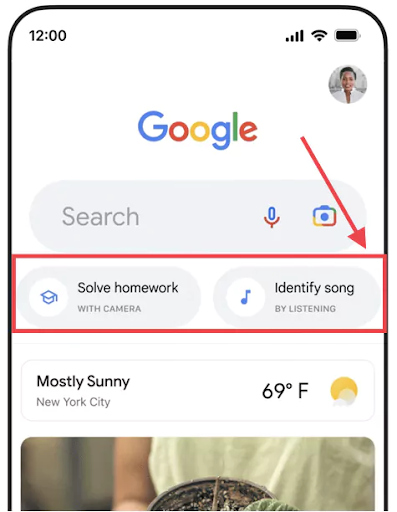
A step beyond voice search, these new shortcuts allow you to use the camera on your phone to take a picture of a question (ideal for students who don’t know the answer to their homework) and even identify a song by listening. No more typing in the one lyric you know and hoping the depths of SERPs bring up what you’re looking for!
- Pre-populated search queries
In a similar manner to the above, Google has also announced it will pre-populate the search bar with suggestions it thinks are relevant to you. For example, if you type in ‘Brighton Pier’, there’s a good chance you might be looking for directions, or to know the weather. As such, you will have the option to click on the ‘weather’ or ‘directions’ suggestions without having to type out what you’re looking for manually.
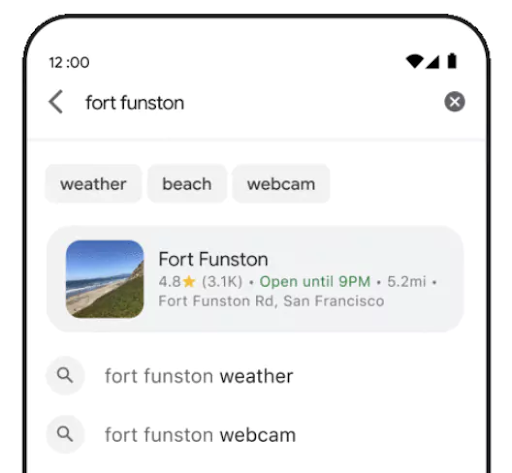
This is based on user intent and behaviours, and is yet another peek at how AI can quite accurately predict human behaviour.
- Search query refinement suggestions
This one is a bit like the update above, but more specific. It uses the same premise, but is more tailored to help bring up more reliable and accurate results. For example, if you’re searching for ‘places to stay in Brighton’, Google might suggest ‘for families’ or ‘for couples’ to help you narrow down your search. This feature will help you sift through your options quicker.
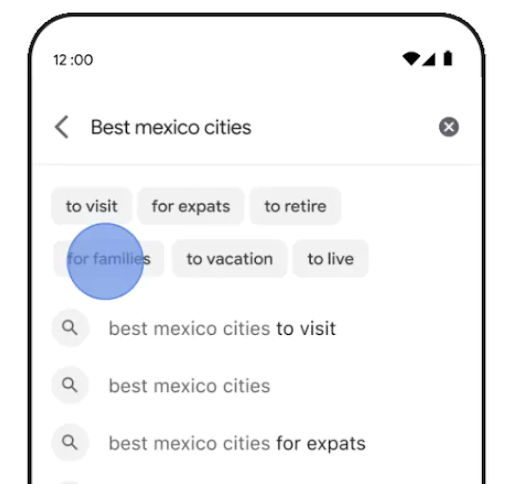
From a marketing perspective, this means if you’ve been targeting long-tail keywords as part of your SEO strategy, you stand to gain a lot more traffic from the more specific search queries.
- Google Web Stories
Everything is about visuals these days, with images and video rapidly overtaking text. Humans like to look at nice things, and that’s what Web Stories aims to take advantage of. It’s essentially an amalgamation of every aspect of Google.
So, if you were to search for ‘Brighton’ through Web Stories, you’d likely see a widget from Wikipedia explaining what/where the city is, a widget for directions, a widget for the current weather, a map widget, and some of the top results from content creators sharing things like where best to eat and pictures/videos they’ve taken.
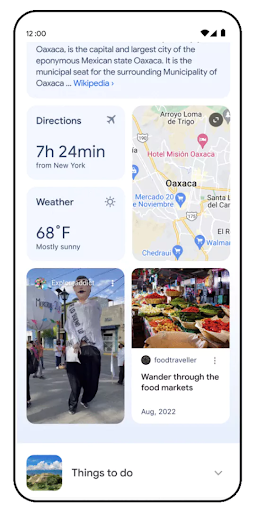
- Discovery feeds
This one is again a bit like the point above, with the aim of negating the need for you to click between Web, Images, Maps, and Videos tabs to find what you’re looking for. This is vastly different to what we’re used to and will be a shock to the system to say the least, but Google thinks this is the future of search.
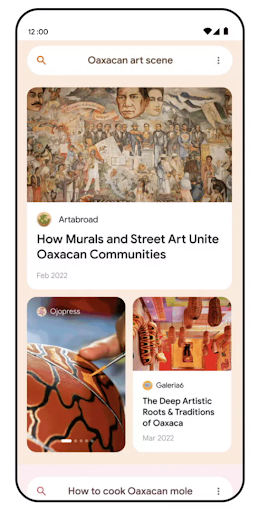
Google said: “You’ll see the most relevant content, from a variety of sources, no matter what format the information comes in — whether that’s text, images or video.”
This reinforces the push for relevant content and is yet another boost for content creators who write for people, not algorithms.
These changes won’t be immediate, but you can expect to see them debut as we head into 2023.
Final thoughts
Usually, Google updates are nothing short of scary for marketers, but this set of updates feels different. Mobile search is changing beyond recognition and morphing into a visual experience instead of just a text-based search. The core update will hopefully continue to reward competent SEO marketers and content creators, and will feed directly into the mobile changes.
It will be interesting to see how users react to the mobile changes when they’re rolled out, and how the algorithm update shakes up the SERPs in the coming months. Most of all, we’re now wondering what the future of desktop search will look like.
For now, if you need help with anything SEO related or to help you rise through the ranks of Google, please get in touch with our Brainy team for expert advice on beating the bots and getting to the top.
Related Services
Who we are
The Brains is an award-winning digital marketing agency, consultancy and training provider in London.
Our Brains are experts in their field, helping companies grow faster, generate leads and overtake competitors.
What we do
Our Brains can help you with everything from ongoing marketing to training up your internal teams.
Give us a call to discuss your needs.

